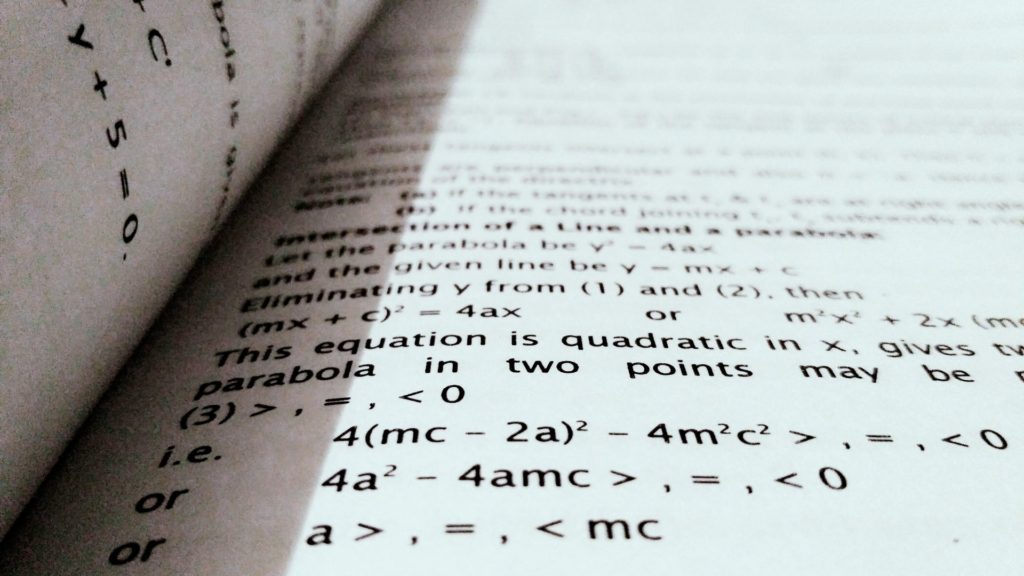This post contains affiliate links and we may earn a commission when you click on the links at no additional cost to you. As an Amazon Affiliate, we earn from qualifying purchases.
- Best Traditional Program: Saxon Algebra 1
- Most Fun Program: Life of Fred Beginning Algebra, Stanley F. Schmidt
- Best for Visual and Kinesthetic Learners: Math-U-See Algebra 1, Demme Learning
It is not uncommon for homeschooling parents to feel a little intimidated when their kids begin high school-level math. Many parents themselves struggled with math in high school, and even those that didn’t may still feel like they’ve forgotten most of the math concepts they were taught in ninth grade. The good news is that there are many excellent high school math curriculum options for homeschoolers that don’t require parents to be expert mathematicians. Most of the curriculum options available can be done by your student independently, but you may still want to follow along and refresh your math skills so that you can help your student when challenges arise.

In this article, we’ll tell you about three of our favorite homeschool algebra curriculums. Algebra refers to the branch of mathematics in which letters and symbols are used to represent numbers in equations and formulas. In the United States, students typically study algebra in ninth grade, though some may be ready for it earlier and others might take it later in high school. If your student is in high school and struggles with math, you might also want to take a look at our article Best Homeschool High School Math for Struggling Students. If you are homeschooling a middle school student, check out our related articles Best Homeschool Math Curriculum for Middle School and Best Math Manipulatives for Middle School.
Best Traditional Program
Saxon has been publishing some of the most popular homeschool math curriculums for many years. Homeschoolers appreciate Saxon’s simple, straightforward structure and approachable design. Students learn concepts incrementally and at their own pace, and they develop confidence in their math abilities rather than just becoming frustrated. Saxon Algebra 1 is among the best homeschool algebra curriculums available, and most types of learners will do very well with this program.
This course covers all the fundamental algebra concepts your student needs to learn. It begins by reviewing addition and subtraction of fractions and basic geometric concepts like angles, polygons, triangles, quadrilaterals, perimeter, and circumference. It then goes on to introduce absolute value, signed numbers, algebraic expressions, factors and coefficients, exponents, negative numbers, equality, distributive property, factors, multivariable equations, and much more.
If all these concepts sound a bit intimidating to you, the homeschooling parent, have no fear. Saxon introduces these concepts step-by-step with a structure that ensures your student understands one concept before moving onto the next, more complex one. And to help your student understand all of these concepts better and be able to move through the program with less parental involvement, a supplementary DVD called Mastering Algebra “John Saxon’s Way” is available that provides daily lessons and demonstrations.
Most Fun Program
Life of Fred Beginning Algebra, Stanley F. Schmidt
If your student finds math boring and struggles to understand why it matters in real life, consider the excellent Life of Fred algebra program by Stanley F. Schmidt. The Life of Fred math series comprises one of the most unconventional approaches to math instruction there is. Written in a storybook format like a novel, Life of Fred tells the story of Fred Gauss, a six-year-old math professor. The humorous series follows Fred through his fun adventures, observing how he encounters the need for math. Students are challenged to use math concepts to help Fred solve his problems.
With Life of Fred, Schmidt provides students with a completely unconventional and unexpected approach to math that is, nevertheless, quite effective. Students who struggle with repetitive math drills or endless equations in textbooks will do especially well with this series, as it makes math fun and also shows students the real-world applications of the math concepts they are learning.
Life of Fred Beginning Algebra can be purchased on its own or in a set with the Zillions of Practice Problems supplement. This series also offers an advanced algebra course for students who have already mastered basic algebra concepts.
Best for Visual and Kinesthetic Learners
Math-U-See Algebra 1, Demme Learning
If your student learns best through visual, kinesthetic, and hands-on instruction, consider the excellent Math-U-See Algebra 1 program by Demme Learning. The Math-U-See series is one of the most popular homeschool math curriculums because of its multi-sensory teaching methods and carefully structured approach. Each lesson includes preparation on the part of the student, discussion of the math concept being taught, practice of that concept until it is mastered, and progression onto the next step. Each lesson teaches concepts using several different tools, such as video demonstrations and manipulatives.
Whatever your homeschooling approach, you’ll find that this program caters well to it. Traditional homeschoolers appreciate the DVD instruction and many practice opportunities provided by the workbook. Classical homeschoolers enjoy the program’s emphasis on concept mastery, and Charlotte Mason-style homeschoolers appreciate the brief, simple, hands-on lessons and narration-style exercises. Even unschoolers love this program because of the way it is organized by level rather than grade. Homeschoolers who focus on unit studies also appreciate how the Math-U-See program organizes its material into conceptual groups.
This program is highly dependent on the use of its unique manipulative kit. All of the Math-U-See programs use this same kit, but it only needs to be purchased once and can be used year after year and shared by multiple children. For the complete algebra course including the manipulative kit, purchase the Math-U-See Algebra 1 Universal Set.
Conclusion
There are several excellent homeschool algebra curriculum options. You’ll want to think about your student’s learning style and your own homeschooling philosophy as you choose the program that’s best for your family. If you have a high school student who struggles with math, take a look at our article Best Homeschool High School Math for Struggling Students. If your student is in middle school, check out our articles Best Homeschool Math Curriculum for Middle School and Best Math Manipulatives for Middle School.
